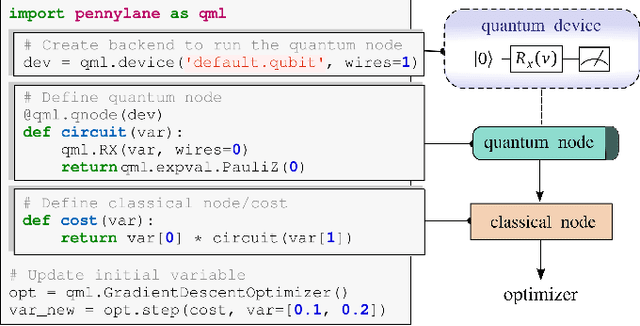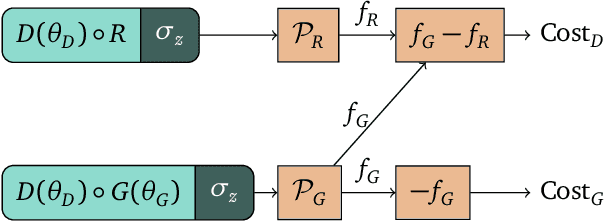Christian Gogolin
PennyLane: Automatic differentiation of hybrid quantum-classical computations
Nov 12, 2018



Abstract:PennyLane is a Python 3 software framework for optimization and machine learning of quantum and hybrid quantum-classical computations. The library provides a unified architecture for near-term quantum computing devices, supporting both qubit and continuous-variable paradigms. PennyLane's core feature is the ability to compute gradients of variational quantum circuits in a way that is compatible with classical techniques such as backpropagation. PennyLane thus extends the automatic differentiation algorithms common in optimization and machine learning to include quantum and hybrid computations. A plugin system makes the framework compatible with any gate-based quantum simulator or hardware. We provide plugins for StrawberryFields and ProjectQ (including a IBMQE device interface). PennyLane can be used for the optimization of variational quantum eigensolvers, quantum approximate optimization, quantum machine learning models, and many other applications.
Quantum Enhanced Inference in Markov Logic Networks
Nov 24, 2016

Abstract:Markov logic networks (MLNs) reconcile two opposing schools in machine learning and artificial intelligence: causal networks, which account for uncertainty extremely well, and first-order logic, which allows for formal deduction. An MLN is essentially a first-order logic template to generate Markov networks. Inference in MLNs is probabilistic and it is often performed by approximate methods such as Markov chain Monte Carlo (MCMC) Gibbs sampling. An MLN has many regular, symmetric structures that can be exploited at both first-order level and in the generated Markov network. We analyze the graph structures that are produced by various lifting methods and investigate the extent to which quantum protocols can be used to speed up Gibbs sampling with state preparation and measurement schemes. We review different such approaches, discuss their advantages, theoretical limitations, and their appeal to implementations. We find that a straightforward application of a recent result yields exponential speedup compared to classical heuristics in approximate probabilistic inference, thereby demonstrating another example where advanced quantum resources can potentially prove useful in machine learning.
* 8 pages, 1 figure
 Add to Chrome
Add to Chrome Add to Firefox
Add to Firefox Add to Edge
Add to Edge